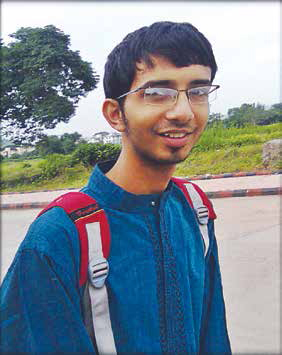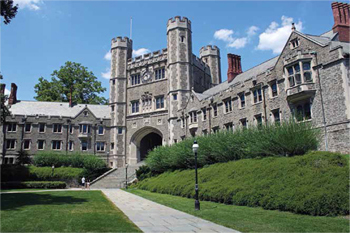Sarthak Parikh finished his schooling in Delhi from Sardar Patel Vidyalaya and graduated from IISER Pune in 2012. At present, he is pursuing a PhD in theoretical particle physics from Princeton University in USA. He talks about his early exposure to research, teaching methods at Pune and Princeton and a lot more. Excerpts from conversation with alumni

I was very intent on a career in research in physics or math, but coming from a family of mostly non-academics, I did not know much about how one went about with it. I used to dearly hope joining an engineering programme would be the first step in that direction, because I was preparing for the engineering entrance exams! I first read about these new institutes called IISERs, which were starting in 2006 near the end of my eleventh grade, and it really struck a chord with me.
So I applied to IISERs through the IIT-JEE stream, but by the time I learnt I had been admitted, it was August and I had already taken admission in Delhi College of Engineering (DCE) and also attended the first day of the term! My parents were a bit uneasy about me cancelling admission to a known engineering college and joining an unknown institute, but very supportive of my choice. When I joined IISER Pune only two weeks later, I was very excited but honestly had no idea how it would all turn out. But I am very glad I chose to come here. IISER Pune is a wonderful, upcoming institute which is getting known more and more with time, and I wanted to do this interview because I hope more students come and join these institutes!
I think it was good, overall. During my first two years here, the courses were compulsory, and were meant to be introductory, covering the basics in a broad range of subfields in physics, math, biology and chemistry, as well as some interdisciplinary topics, and included labs. The course structure was evolving rapidly during the early stages, as IISER experimented with what worked best. For example, our very first course in math was in group theory – shockingly abstract and absolutely unfamiliar to many of us. Not the most welcoming present for us, and many tears were shed! Personally it was a struggle, but it was still a serendipitous early exposure to a beautiful branch of mathematics.
Things were very flexible during the third and fourth year – when more advanced courses were offered. You had the freedom to sign-up for any combination of courses from any subject you liked, which fit in the timetable and met the minimum credit requirement. There was also a requirement during the third year of having at least one course from outside the discipline should you choose to take all courses from a single discipline. This was great, I think. Besides the advanced physics courses on offer, I went for an advanced math class and a quantum chemistry class. It was also fun to audit other interesting classes in math. One should still keep in mind that although there were no department specific requirements in Pune, if I wanted to go to graduate school in say physics, I’d be better off having taken all the standard physics courses which were offered.
We were encouraged to join a lab or a theory group and get started with extra reading or research during the first two years. Besides that, in the third and fourth year, students had the choice to credit something called a “theory/ reading project” course. This course provided the perfect opportunity for students to work with faculty members on a semester long reading or research project, while having it counted towards their credit requirements. This was a great way to learn more about a topic, something you might not have inside a classroom. Also this was a great way to get exposure to research at an early stage. I really liked this and chose this course every semester. In my case I worked with the same faculty member, Sudarshan Ananth every time, so this meant I had two years of official reading projects leading to research, as part of my curriculum.
Additionally, the fifth year was devoted entirely to a research project towards an MS thesis, with no required coursework. The students had the freedom to work with any faculty anywhere in the world. I chose to continue working with Sudarshan Ananth. As I had begun doing reading projects with him starting in my second semester, the course structure at IISER gave me a chance to continue working with him for four and a half years in total. This allowed me to spend ample time on reading projects and get a first exposure in research work, at my own pace.

Yes I believe it did. I had little idea about what a PhD was when I joined IISER. The courses at IISER and working with my advisor for over four years during my undergrad really helped me get a flavour of what research can be like. This included tangible things like learning physics, getting a peek at research in theoretical physics, and helping me plan my next steps towards graduate school after the masters at Pune. There are also many intangible things that I tried picking up over time.
I think the common undertone could be that research is very different from sitting for an exam, or solving problems from the back of a book – in both cases solutions to the problems are known to exist, well unless you are Stokes asking students to prove what later became known as the Stokes’ Theorem! Let me give three examples. One of them is learning that it’s okay to experience tough phases when you are working on a research problem and not making significant progress – which happened with me. One must not be discouraged but keep on striving, and hacking at the problem in different ways – maybe one of them will present a way out, maybe there will be none. It takes time, hard work and many failed attempts to build an intuition for what could be a good research problem and devising ways to approach it – and giving up because one is initially struggling is the last thing one should do!
A second related example is learning that sometimes it helps to take your mind off a problem and work on something else during that time. For example, I once took a break for a month from a problem when I was stuck on one of the steps. Later, when I came back to it with a fresh mind, the solution came to me almost immediately. This is incidentally another benefit of working long-term with the same faculty member – the pressure of finishing something in time can be stressful sometimes and may actually impede further progress.
As a third example, another intangible thing I learnt about was the importance of communicating science in general and one’s research in particular, both spoken and written — with your collaborators, your peers, and a broader audience. It’s an essential skill and worth spending time and effort on. These are just some examples. There are other equally important things such as being honest, learning to be critical of your own work, and learning to enjoy doing research.
I was fortunate to get exposed to things like these at IISER and also while working with my advisor on research projects. I think he always led by example, and by being around him I may have picked up some of these by osmosis.
When I joined IISER Pune, I was very excited but honestly had no idea how it would all turn out. But I am very glad I chose to come here
Here the qualifying exams comprise of three requirements – a minimal course requirement, a preliminary written exam, and an experimental project oral. The preliminary written examination, lovingly called the Prelims, tests you on your advanced undergraduate classical mechanics, electrodynamics, statistical mechanics, and quantum mechanics. These are offered about four months into your first year, and involve solving challenging problems from each subdiscipline in a timed exam setting.
I think the coursework at Pune provided sufficient background needed to prepare for this exam. I needed to brush up on my undergraduate knowledge and learn some advanced techniques here and there, but I don’t think any of us first-year graduate students had to take any undergraduate classes at Princeton to prepare for it. The best way to prepare for the prelims was to solve prelim problems from previous years. We used to work together in groups for that – it really helps!
Research. You have begun talking with faculty, and working on projects. There is a great culture in the department, and the graduate students get to talk and work with amazing post-docs and faculty in the department, as well as at the Institute for Advanced Study which is just a mile away. A lot of collaborations take shape and graduate students are encouraged and given the freedom to be an active part of this process. Eventually you want to become an independent researcher, and I think the programme helps you work towards that.
I think they are more structured and much more intense than they were in Pune. I’m not really well-versed with the undergraduate course structure at Princeton, but I believe students have a lot of flexibility in choosing courses here. They have a year or two to declare what their major will be. As far as physics undergraduate courses go, I have been a Teaching Assistant (TA) for freshman mechanics and electromagnetism courses at Princeton. These courses are offered at varying degrees of difficulty and depth.
In the short-term, my plan is to be a post-doctoral research fellow after graduate school. In the long run, I wish to have an academic position as a theoretical particle physicist, and continue doing research while possibly also teaching.
by Vikesh